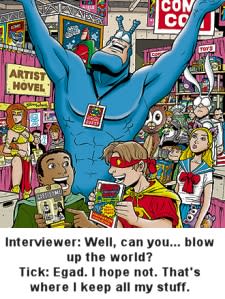Working As Intended: But I already have that game
Back in 2001, I desperately wanted out of EverQuest. I hated the gameplay. I hated the community. I loved my guildies, but I hated what our guild was becoming, consumed by a grindy rat race so different from our roots in Ultima Online. When Dark Age of Camelot offered a way out, I took it, dragging as many guildies as I could along with me to a game where PvP and territory control, not camp checks and plane raids, ruled the day.
Some of them didn't come with us, and I couldn't understand why they wouldn't jump at the chance to start fresh, to be rid of a self-destructive community and gear grind. What was wrong with them, I wondered, that they'd stay in some old thing rather than play the new shiny?
Dozens upon dozens of MMOs later, I finally understand: They already had that game.
And the truth was, I hadn't given up my old games, either. I set time aside to raid in EverQuest with my guild, and then when that was done, I went right back to puttering around in Ultima Online and Asheron's Call because their freewheeling gameplay suited me so much more. In discarding EverQuest, I wasn't giving up the only MMO I'd ever been popular, rich, and high-level in. It was just one of my games, one I didn't actually enjoy, so it was easy for me to walk away.
But for some of my guildies, it was their baby, their first MMO, even their first RPG character. They had put years into the game, getting as far as they had, invested as they were. They had no "fallback" MMO or even a frame of reference for how the industry was shaping up outside of the walled garden of EverQuest. They weren't about to leave right as they finally felt as if they were winning. It wasn't about old vs. new at all, and it wasn't about fear of new things; it was simply that they didn't want to start over. They didn't want to be a newbie again or go through the long and painful slog of the newbie experience one more time.

The fact that "being a newbie in an MMO" has a reputation as a long and painful slog worth avoiding is a problem all to itself, of course, and it's part of why so many MMO gamers stay in old games in spite of the mockery of their progressive, try-everything peers. I won't say it's never about aversion to old things or aversion to new things, but once you toss out obvious generational trolling, you're left with the dread of the newbie grind and the depressing sameness of modern MMOs that keep people playing the one they already have (or retreating to the one where they're already a big fish once they've dived into a new pool and found the experience wanting). When studios release MMOs and MMO patches with such frequency, oftentimes copying each other's features so assiduously as to provoke the word "clone," it's not hard to understand why people would simply look at the new one and shrug. They already have that game. It's where they keep all their stuff.
My colleague and podcast host Justin Olivetti once penned a blog post, Dear MMOs, this is why I'm (currently) not playing you, in which he explained why he was not playing 10 different AAA MMOs. Naturally, the reasons home in on the games' unappealing aspects, but look at exactly the types of things that drive him away. "Barrier-to-entry," "grind," "full-time job," "been there and done that," "finished the game," "jump through hoops," "too huge," "long and generic," "limited and boring." I say this not to criticize him (every point he makes is legitimate) but to emphasize that we often avoid games not because we're "burned out on games" or are part of the "MMO burnout crowd" but because we're burned out specifically on the repetition of work-like gameplay and clones and the industry churn itself. At some point, we're overwhelmed with malaise. We just want to curl up with a cozy MMO home, safe under that warm blanket of familiarity and comfort, and not have to be a vagabond wandering around a genre, paying to be disappointed over and over again.
This is why so many MMO players find themselves back in World of Warcraft again for every expansion, even if they spent the last two years complaining about the content drought. WoW is comfortable. They know exactly what to expect. They know how to dodge the game's seedier players. They know how to game the game. They know exactly how the whole shebang will work. But it's also why I didn't buy The Sims 4 in spite of my having purchased every single expansion for every single Sims game before it. It's why I can't bring myself to dedicate my sandboxer's soul to ArcheAge even though it has almost everything I want in an MMO. It's why RPS called Assassin's Creed sequels "no longer critically relevant." It's why brand loyalty is easy to exploit. It's why people use lots of mobile apps but don't download many new ones. They already have that game.
Massively's Jef Reahard made a poignant observation many months ago: "I think people are subconsciously looking for any excuse to write off an MMO," he argued, "because there are too many of them to keep up with." I've done this myself. As a player and a writer, I often feel overwhelmed by all the games that think they're good enough to demand 40 hours a week of my time, let alone by all the games we cover on a monthly basis. I cheer this embarrassment of riches for the variety and the choice that our genre now has, but no one can play them all. You can't even make a good dent into them anymore. And so our reasons for not doing the impossible, for not playing all the things, become shallower and shallower, almost as if we're ashamed to admit we're happy with what we have, that we're comfortable and content already but still need a justification for not-playing that's more compelling than that -- again -- we already have that game.

As a college band geek, I was once stuck on an interminably long tour bus trip with the co-ed cheerleading squad, and the fight over the bus TV was fierce. After a much-contested showing of Independence Day, someone suggested Star Wars. "But we already saw that movie!" the cheerleaders sneered. Imagine my offense as a girl obsessed with Star Wars! How could they not understand such obvious subtleties!? But from their point of view, so distant from mine, every sci-fi movie with heroes and aliens and spaceships and laser-beam superweapons was more or less the same, and they didn't want to sit through another two hours of it.
So yes, it's easy for us, we people who write about video games for a living and you people who love them so much that you read and comment about them for fun, to have nuanced conversations about whether ArcheAge is a true sandbox, how Star Wars: The Old Republic is more like a single-player game than an MMORPG, or what exactly WildStar borrowed from WoW because we see them as distinct worlds defined by their subtleties. But we're not most people or most gamers. We're not even most MMO gamers. And most MMO gamers, the PvE "casuals" who make up the bulk of our extended community, really don't see all that much difference between the titles that roll out every year, these games that are asking them to pay again to basically do the same things with the same types of experiences for the same rewards, over and over and over. That's a perception that keeps the MMO genre stagnant and makes it harder and harder for games that do dare to innovate in one direction or another to gain a foothold (outside of a few insane outliers with crossover appeal). Traditional MMO gamers are stuck in a feedback loop where our gaming comfort zones and accumulated personal MMO prestige are directly at odds with the innovation we say we desire.
Ahead of WoW's expansion launch next month, we're already seeing MMOs step up their game to hold onto us with majorupdates and experience boosts and free gametime. But MMOs can't just iterate on World of Warcraft if they want to compete against WoW in WoW's world. WoW is so culturally pervasive that everyone and his dog have a character to go back to in WoW, which makes a WoW-killer that isn't sufficiently different from WoW a hard sell, literally. After all, we already have that game.

The MMORPG genre might be "working as intended," but that doesn't mean it can't be so much more. Join Massively Editor-in-Chief Bree Royce on random Fridays in her Working As Intended column for editorials about and meanderings through MMO design, ancient history, and wishful thinking. Armchair not included.


